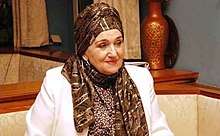Emina Zečaj
Emina Zečaj (née Ahmedhodžić; 17 March 1929 – 19 April 2020)[1] was a Bosnian interpreter of the traditional folk music, sevdalinka.[2]
Emina Zečaj | |
|---|---|
 | |
| Born | Emina Ahmedhodžić 17 March 1929 |
| Died | 19 April 2020 (aged 91) Sarajevo, Bosnia and Herzegovina |
| Resting place | Bare Cemetery, Sarajevo |
| Occupation |
|
| Years active | 1962–2020 |
| Children | 2 |
| Musical career | |
| Genres | |
| Instruments |
|
| Labels | |
| Associated acts | |
Zečaj was called an "icon of traditional Bosnian music" by American Billboard magazine in 2004.[3]
Early life
Emina was born in Sarajevo's Old Town, in what is today Bosnia and Herzegovina. She was born 17 March, but sources differ as to which year; 1931 (as her age was said to be 85 in a 2016 interview), or 1939 as most sources suggested. However when she died in 2020, it was revealed she was actually born in 1929. She was the daughter of Bosniak parents Avdija Ahmedhodžić and his wife Melća.[4]
Career
Professor Cvjetko Rihtman, an ethnomusicologist, discovered her in the early 1960s. Following persuasion from her friends, Emina auditioned before two well known professors, Zvonimir Nevžela and Beluš Jungić, with the folk songs Kad se jangin iz sokaka pomoli and Poranila na vodicu Zlata. Ten days later she received a phone call from Ismet Alajbegović Šerbo informing her that she had been accepted into Radio Sarajevo, beating out 30 other contestants.[5][6]
Zečaj recorded music for the 2003 drama-comedy film Fuse. She also collaborated with Adi Lukovac on the soundtrack for the 2003 war film Remake (Remake - soundtrack).[7] It was Lukovac's final project before dying in a car accident three years later.
Death
Zečaj was in good health until shortly before her death at age 91. She died on the night of 19 April 2020 in her home.[1] She had attended the funeral of Beba Selimović the previous month at Sarajevo's Bare Cemetery where she was also buried in a Muslim cemetery on 22 April 2020.[8][9]
Discography
External links
- Emina Ahmedhodžić-Zečaj at Discogs
- Emina Zečaj discography at Discogs as Emina Zečaj
References
- "Preminula Emina Zečaj, jedna od najvećih interpretatorki sevdalinke". Radio Sarajevo.
- "Who is who among Bosniacs; page 529". Google Books. 2001. Retrieved 18 November 2014.
- "Billboard magazine; page 53". Google Books. 14 February 2004. Retrieved 18 November 2014.
- "Emina Zečaj, interpretatorka sevdalinke - Ikona bh. sevdaha". Ekapija. 5 September 2012. Retrieved 18 November 2014.
- "Emina Zečaj: Ne može sevdalinka biti ničija nego naša, bosanska". Radio Sarajevo. 13 March 2016. Archived from the original on 18 April 2016. Retrieved 7 April 2016.
- "Čitav život se borim za sevdah". Nezavisne. 8 September 2008. Retrieved 18 November 2014.
- "Priča i pjeva u emisiji Četvrtkom o kulturi". Radio Sarajevo. 10 March 2016. Archived from the original on 18 April 2016. Retrieved 7 April 2016.
- "U 89. godini preminula Emina Zečaj". www.faktor.ba.
- "Obavljena dženaza Emini Zečaj". Avaz.ba.
- "Pijana sam i bez pića". Discogs. 1974. Retrieved 18 November 2014.
- "Narodne pjesme iz Bosne". Discogs. January 1975. Retrieved 18 November 2014.